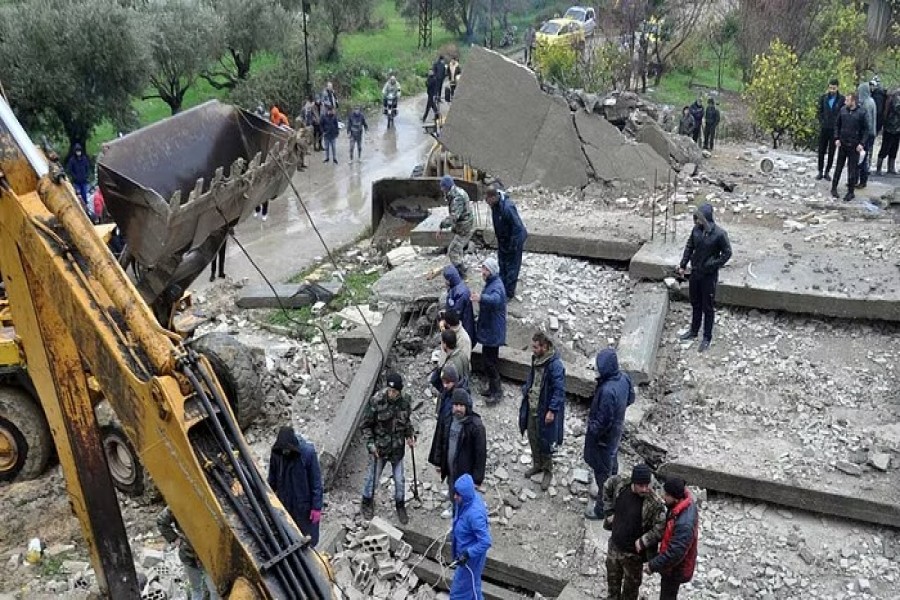President Bashar al-Assad is seeking political advantage from an earthquake that has devastated large parts of Syria and Turkey, pressing for foreign aid to be delivered through his territory as he aims to chip away at his international isolation, analysts say, Reuters reports.
Amid an outpouring of sympathy for the Syrians hit by the earthquake, Damascus has seized the moment to reiterate its long-standing demand for aid to be coordinated with his government, shunned by the West since Syria's war began in 2011.
Western powers have shown no sign they are ready to meet that demand or re-engage with Assad, but his hand has been strengthened by difficulties facing cross-border aid flows into Syria's rebel-held northwest from Turkey.
The aid flows, critical to 4 million people in the area, have been temporarily halted since the earthquake, although a UN official expressed hope they could resume on Thursday. Damascus has long said aid to the rebel enclave in the north should go via Syria not across the Turkish border.
"Clearly there is some kind of opportunity in this crisis for Assad, for him to show 'you need to work with me or through me'," said Aron Lund, a Syria expert at the Century Foundation.
"If he is smart he would facilitate aid to areas outside his control and get a chance to look like a responsible actor, but the regime is very stubborn."
The West has long shunned Assad, citing his government's brutality during more than 11 years of civil war that has killed hundreds of thousands of people, uprooted more than half the population, and forced millions abroad as refugees.
But the frontlines have been frozen for years and Assad, backed by Russia and Iran, controls the biggest part of the fractured country.
The US State Department has shot down the suggestion that the earthquake could be an opportunity for Washington to reach out to Damascus, saying it will still provide aid to Syrians in government-held areas via NGOs on the ground not the government.
"It would be quite ironic, if not even counterproductive, for us to reach out to a government that has brutalised its people over the course of a dozen years now – gassing them, slaughtering them, being responsible for much of the suffering that they have endured," US State Department Spokesperson Ned Price told a briefing this week.
Still, the leaders of some US-aligned Arab states have been in touch with Assad since the disaster, including Jordan's king and the presidents of the United Arab Emirates and Egypt.
Jordan and the UAE, which once backed Syria's opposition but have normalised ties with Assad in recent years, have sent aid to Damascus, Syrian state media has reported.
Government-held areas have been hit hard by the earthquake. The overall death toll reported so far from Syria - around 2,500 - is equally split between government- and rebel-held areas.
Key ally Russia has provided support, sending rescue teams and deploying forces already in Syria to join relief work.
Russia, locked in a conflict in Ukraine and under US sanctions, was fast to help Syria. Moscow regards its alliance with Damascus as a bargaining chip with the West.
WRANGLE OVER RESOURCES
Moscow has long argued that delivering aid to northwest Syria from Turkey violates Syrian sovereignty. Extending the mandate for that aid operation has prompted diplomatic wrangling between Russia and Western powers at the Security Council.
Syrians in the enclave worry Damascus would choke off aid if the Turkish route was shut and the government controlled flows.
Aid agencies, meanwhile, have been exploring ways to keep help flowing to the area, including via government-held areas.
"The UN and partners will continue to seek ways to expand points of access and ensure that help reaches the most vulnerable," El-Mostafa Benlamlih, the top UN humanitarian official for Syria, said. "Ensuring that aid reaches those who need it most will require political will from all actors."
Syria's UN Ambassador Bassam Sabbagh asked U.N. Secretary-General Antonio Guterres for help in a meeting on Monday. But he said aid flows must be coordinated with the government and delivered through Syria not across the Turkish border.
Syrian Foreign Minister Faisal Mekdad said this week the government was ready "to allow aid to enter all regions as long as it does not reach the armed terrorist groups", referring to rebels.
Mekdad told Arabic broadcaster al-Mayadeen that sanctions were "increasing the difficulty of the catastrophe".
The Damascus-based Syrian Red Crescent called for lifting of sanctions, which Syria's government has long blamed for mounting economic hardship. Washington tightened sanctions in 2020.
Western states say they aim to put pressure on Assad to end repression and negotiate a political settlement. The United States says the sanctions do not target humanitarian aid.
Joshua Landis, head of the Center for Middle East Studies at the University of Oklahoma, said Damascus was trying to leverage aid "to legitimise the regime".
"There is an outpouring of compassion by all Arabs and the world at large for the Syrians who have suffered so much. Assad will try to exploit this."


